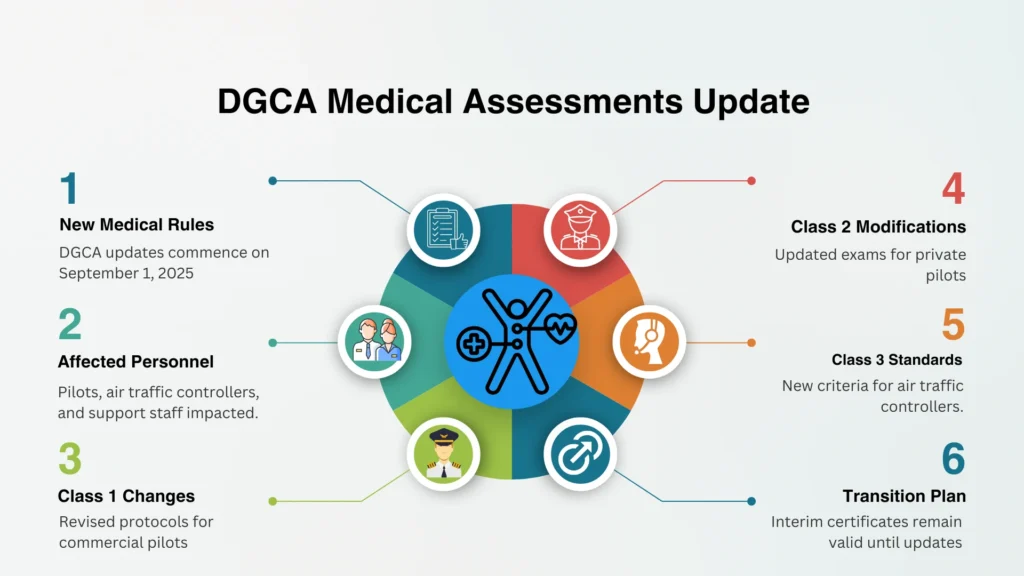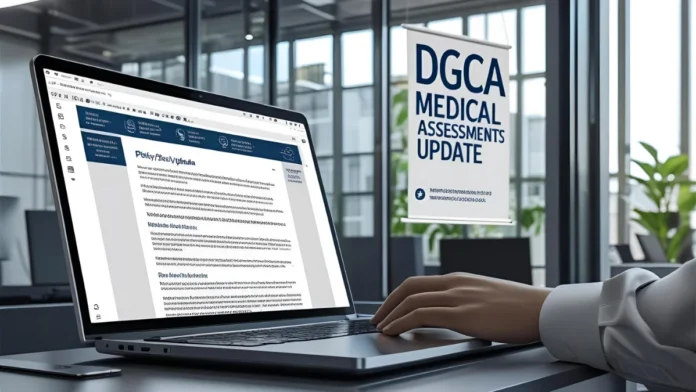DGCA Medical Assessments Update: Beginning on September 1, 2025, the Directorate General of Civil Aviation (DGCA) will implement a set of updated medical assessment guidelines. According to a recent press release by the DGCA, these updates aim to enhance aviation safety and ensure compliance with international aviation standards.
These new regulations will have significant implications for a wide range of aviation personnel, including pilots, air traffic controllers, and various support staff.
Under the revised medical requirements, individuals in these roles will be subjected to more rigorous health evaluations to monitor their fitness for duty.
The requirements include comprehensive assessments of physical and mental health, potentially incorporating advanced technology for evaluating cognitive functions and overall well-being.
These changes aim to identify any medical conditions that could compromise safety in operations, thereby fostering a safer flying environment for both crew and passengers.
All personnel will be required to present valid medical certificates that meet the new standards, and regular re-evaluations may be mandated to ensure ongoing compliance.
DGCA will arrange training and informational sessions to help personnel understand the DGCA Medical Assessments updateand prepare for the changes.
This proactive approach reflects a commitment to maintaining the highest level of aviation safety while aligning with global best practices.
Key Changes in DGCA Medical Assessments Update

The forthcoming modifications are substantial and encompass updates across all three categories of medical evaluations, as outlined below:
| Medical Assessment Class | Effective Date | Key Changes |
| Class 1 | September 1, 2025 | Revised examination protocols |
| Class 2 | September 1, 2025 | Modified examination procedures |
| Class 3 | September 1, 2025 | New assessment criteria |
Focus on Safety and Compliance
The updates issued by the Directorate General of Civil Aviation (DGCA) will guarantee that all aviation personnel are adequately prepared and healthy to carry out their responsibilities, thereby enhancing passenger safety.
Adhering to the conditions in the DGCA medical assessments update is of utmost importance, and DGCA will rigorously monitor their implementation and compliance to uphold the highest standards of safety in the aviation industry.
Detailed Overview of Each Medical Class
Class 1 Medical Assessment
Who Requires Class 1 Evaluations?
Class 1 medical assessments will apply to commercial pilots and individuals in high-risk aviation roles.
Revised Examination Protocols
- The implementation of new examination protocols aims to align with stringent global safety standards, ensuring enhanced safety and compliance in our practices.
- Enhanced cardiovascular and psychological evaluations.
Documentation Requirements
- The updated documentation guidelines aim to promote consistency and thoroughness in recording and processing information.
- It is essential to submit all required paperwork on time to prevent delays in the medical certification process.
| Category | Existing Requirements | Revised Requirements |
| Examination Protocols | Previous guidelines | New protocols introduced |
| Documentation | Previous documentation requirements | Updated documentation requirements |
| Validity Period | Same as current DGCA rules | Remains the same |
Class 2 Medical Assessment
Applicable Personnel
Class 2 assessments are for private pilots and aviation staff who do not require Class 1 certification.
Modified Examination Procedures
- New protocols enhance the medical evaluation process.
- Revised documentation increases accountability.
Certification Process Changes
- Updated processes ensure accurate issuance of medical certificates.
Class 3 Medical Assessment
Compliance for Air Traffic Controllers and Support Staff
New Class 3 guidelines will ensure both safety and operational efficacy.
Key Medical Standards
- Visual Acuity: Minimum vision requirement of 6/9 in both eyes.
- Auditory Function: Ability to hear normal conversational voices at a distance of 2 meters.
- Cardiovascular Health: No significant cardiovascular disease present.
| Medical Standard | Requirement |
| Visual Acuity | Minimum 6/9 in each eye, with correction |
| Auditory Function | Hear a conversational voice at 2 meters |
| Cardiovascular Health | No significant cardiovascular conditions |

Transition Period and Implementation Strategy
To ensure a smooth transition to the new guidelines, the DGCA has outlined a strategy:
Interim Certificate Issuance
- Currently, a Fit Medical Certificate (CA-35) issued by DGCA-empanelled medical examiners will remain valid until the new rules take effect.
Validity of Existing Assessments
- Existing medical certificates will continue to be recognized, allowing personnel to prepare for the updated requirements.
| Aspect | Interim Measure | Long-term Implementation |
| Medical Certificate Validity | Existing certificates remain valid | New certificates issued per revised guidelines |
| Certificate Issuance | CA-35 by DGCA Empanelled Medical Examiners | Certificates issued under new assessment protocols |
| Aviation Personnel Action | Continue with current medical assessments | Compliance with revised DGCA medical regulations |
Conclusion: DGCA Medical Assessments Update 2025
The Directorate General of Civil Aviation (DGCA) has introduced a set of new medical regulations that will come into effect on September 1, 2025. These updated guidelines are a significant advancement in promoting aviation safety and aligning with international standards for personnel health assessments in the aviation industry.
It is essential for all aviation personnel, including pilots, air traffic controllers, and maintenance staff, to familiarize themselves with these new regulations thoroughly.
This knowledge is essential not only for maintaining their professional certifications but also for ensuring the safety and well-being of operations in the aviation sector.
Staying informed about the specific changes in testing protocols, the documentation required, and the updated certification processes will be crucial for aviation professionals as they navigate these new requirements.
Engaging with this information early will help individuals and organizations prepare adequately for the transition and sustain effective operations in the skies amidst evolving safety standards.
Source: DGCA – Announcements

